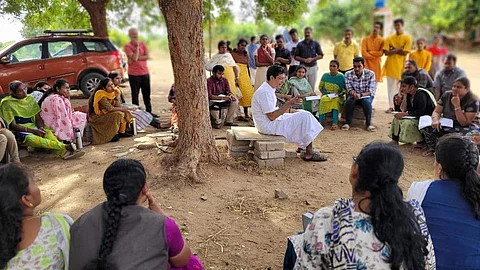

Anaadi Foundation and Dharma Gurukulam in the outskirts of Palani, offered a kaleidoscopic view into some historic science breakthroughs in traditional Indian Knowledge Systems (IKS). More than 1,200 children from Classes V to XI participated joyously in this event.
The fair was unique as it had experts and foremost researchers in the domain of Indian Knowledge Systems offering specially designed exhibits and demonstrations for school children.
Prof V Kamakoti, Director of IIT Madras presided over as the chief guest and enthralled students with his inspiring address on the rich scientific heritage of India.
Prof Kamakoti said, “The National Education Policy 2020 (NEP 2020) has incorporated Indian Knowledge Systems as part of the emerging curriculum and has emphasised on children understanding the emergence of various original scientific breakthroughs made in India since ancient times. Many of the reputed IITs (Indian Institutes of Technology) have now set up IKS Research Centers that work on unearthing and disseminating our traditional knowledge systems. Hence, the Anaadi Foundation's Rural Science Fair in the theme of IKS is highly laudable for making students aware of the age-old scientific development of our nation.”
Smrithi Adinarayanan, founder of Anaadi Foundation and Dharma Gurukulam, hosted the event and shared, “For more than a decade in academia and beyond, we have been working on bringing pedagogical solutions derived from India’s rich scientific heritage. Drawing from various source texts, we bring lessons and demonstrations from Ayurveda, Astronomy, Mathematics, Metallurgy, Architecture, Linguistics and Ecology.”
Gomathi Venkatachalam, CEO of Anaadi Foundation shared that this is the fourth edition of the rural science fair which has continued to make top experts accessible to rural children. Vidhyashankar from Apple Inc was the special guest for this science fair and he shared how thrilled he was to see the display of scientific thinking in children.
Children, teachers and volunteers of Dharma Gurukulam put up 15 thematic stalls each offering a micro-learning experience for the participants. In Astronomy, children understood how the ecliptic or the rashi-chakra was used as a frame of reference to track the motion of celestial bodies. They also learnt the trigonometric nuances in the calculation of lunar day or tithi. Most eye-catching were the models of Jantar Mantar and the ancient time-keeping units such as Ghatika Yantra.
In Math, children learnt how Aryabhata and Bhaskaracharya defined the areas of polygons and how various geometric proofs were demonstrated in ancient Indian mathematics. They also learnt how a mathematician Ganesha Daivajna explained the algebraic identities very interestingly. They also learnt to apply these identities to perform speed maths.
Through Ayurveda principles, children understood the classic ingredients and spices in an Indian kitchen. They also understood how the taxonomy of taste is engineered towards wholesome nutrition and how the foundational diagnosis of Nadi Pariksha is performed by Ayurvedic Vaidyas. Researchers presented interesting advances made in the intersection of Yoga and Neuroscience. Experts presented models of cow-centric energy alternatives for grid-free and fossil-fuel-free living.
The principal of a visiting school said, “For children, as well as our teachers, the science fair helps us with one, understanding how scientific thinking is integrated into our civilisational best practices. And two, it helps us move away from a euro-centric view of science and appreciate the scientific heritage of India.”
